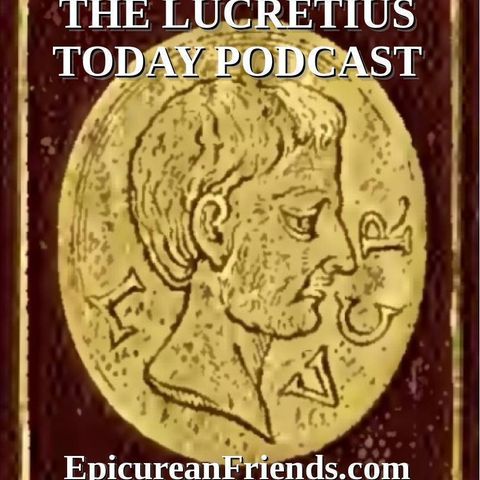Episode 254 - The Skeptic Asks: Does Not Epicurus Undermine Religion As Much Any Outright Atheist? - Cicero's OTNOTG 29

Descarga y escucha en cualquier lugar
Descarga tus episodios favoritos y disfrútalos, ¡dondequiera que estés! Regístrate o inicia sesión ahora para acceder a la escucha sin conexión.
Episode 254 - The Skeptic Asks: Does Not Epicurus Undermine Religion As Much Any Outright Atheist? - Cicero's OTNOTG 29
Esta transcripción es generada automáticamente. Ten en cuenta que no se garantiza una precisión absoluta.
Descripción
Welcome to Episode 254 of Lucretius Today. This is a podcast dedicated to the poet Lucretius, who wrote "On The Nature of Things," the most complete presentation of Epicurean philosophy...
mostra másEach week we walk you through the Epicurean texts, and we discuss how Epicurean philosophy can apply to you today. If you find the Epicurean worldview attractive, we invite you to join us in the study of Epicurus at EpicureanFriends.com, where we discuss this and all of our podcast episodes.
Today we are continuing to review Cicero's "On the Nature of The Gods," which began with the Epicurean spokesman Velleius defending the Epicurean point of view. This week will continue into Section 42 as Cotta, the Academic Skeptic, continues to attack the Epicurean view of the nature of divinity.
Today's Text XLII. And why should we worship them from an admiration only of that nature in which we can behold nothing excellent? and as for that freedom from superstition, which you are in the habit of boasting of so much, it is easy to be free from that feeling when you have renounced all belief in the power of the Gods; unless, indeed, you imagine that Diagoras or Theodorus, who absolutely denied the being of the Gods, could possibly be superstitious. I do not suppose that even Protagoras could, who doubted whether there were Gods or not. The opinions of these philosophers are not only destructive of superstition, which arises from a vain fear of the Gods, but of religion also, which consists in a pious adoration of them.
What think you of those who have asserted that the whole doctrine concerning the immortal Gods was the invention of politicians, whose view was to govern that part of the community by religion which reason could not influence? Are not their opinions subversive of all religion? Or what religion did Prodicus the Chian leave to men, who held that everything beneficial to human life should be numbered among the Gods? Were not they likewise void of religion who taught that the Deities, at present the object of our prayers and adoration, were valiant, illustrious, and mighty men who arose to divinity after death? Euhemerus, whom our Ennius translated, and followed more than other authors, has particularly advanced this doctrine, and treated of the deaths and burials of the Gods; can he, then, be said to have confirmed religion, or, rather, to have totally subverted it? I shall say nothing of that sacred and august Eleusina, into whose mysteries the most distant nations were initiated, nor of the solemnities in Samothrace, or in Lemnos, secretly resorted to by night, and surrounded by thick and shady groves; which, if they were properly explained, and reduced to reasonable principles, would rather explain the nature of things than discover the knowledge of the Gods.
XLIII. Even that great man Democritus, from whose fountains Epicurus watered his little garden, seems to me to be very inferior to his usual acuteness when speaking about the nature of the Gods. For at one time he thinks that there are images endowed with divinity, inherent in the universality of things; at another, that the principles and minds contained in the universe are Gods; then he attributes divinity to animated images, employing themselves in doing us good or harm; and, lastly, he speaks of certain images of such vast extent that they encompass the whole outside of the universe; all which opinions are more worthy of the country of Democritus than of Democritus himself; for who can frame in his mind any ideas of such images? who can admire them? who can think they merit a religious adoration?
Información
| Autor | Cassius Amicus |
| Organización | Cassius Amicus |
| Página web | - |
| Etiquetas |
-
|
Copyright 2024 - Spreaker Inc. an iHeartMedia Company

Comentarios